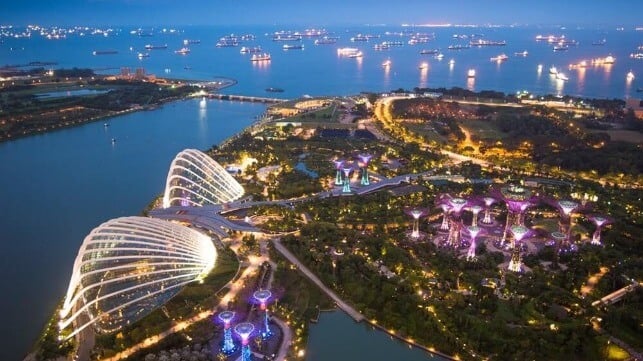How Classification is Evolving to Support Innovation and Sustainability

The maritime sector is evolving as artificial intelligence (AI) and digitalization redefine operational standards. This shift offers unprecedented opportunities to enhance efficiency, safety, and sustainability. We find ourselves in an exciting time when smart ships, autonomous operations, and other emerging technologies are set to transform the maritime industry.
For instance, in the coming years, smart ships are set to experience steady growth. A 2024 report revealed that the connected and smart ship market size reached $6.10 billion in 2023 and is anticipated to escalate to $8.5 billion by 2030. By harnessing technologies like the Internet of Things (IoT), AI, and machine learning, smart ships enable real-time data analytics and remote monitoring, helping to optimize fuel consumption and minimize downtime, further lowering operational costs.
As exciting as this change is, we must also consider the need to navigate this transition in a coordinated, consistent, and thoughtful way, seizing the opportunities whilst remaining alert to the new and emerging challenges. This requires creative thinking, new tools, and fresh ways of working and approaching the traditional business - and who better to spearhead this than classification societies?
The role of classification in driving innovation forward
Classification societies are instrumental in fostering innovation and sustainability within the shipping industry. They act as a bridge between shipowners, shipyards, and regulatory bodies, translating standards into pragmatic best practices for ship design and operations.
As digitalization is increasingly integrated into vessels, the maritime sector faces a spectrum of opportunities and challenges. Technologies like AI offer avenues for improving shipping performance, such as cost reduction, risk mitigation, emission reduction, enhanced forecasting, and optimized cargo movements through efficient route planning. However, alongside these benefits come challenges, particularly in addressing cybersecurity threats.
Initially, AI was deployed for streamlined calculations, but it now extends to sophisticated data analysis from sensors and applications, fostering seamless data integration and processing. Traditional vessel surveys have transitioned to hybrid remote-augmented surveys, leveraging AI-driven computer vision for corrosion detection through drones, thereby enhancing safety. Data-driven approaches are used to develop optimized and predictive survey schemes, integrate OCR and Robotics Process Automation for enhanced internal efficiency, and utilize natural language processing for rule access. Additionally, generative AI is used in chatbots to expedite client inquiries and service delivery.
On the other hand, with increased connectivity, shipowners are increasingly vulnerable to escalating cyber threats, necessitating compliance with stringent regulations like IMO Resolution MSC.428(98) and the IACS Unified Requirements. In the second half of 2024, upcoming cybersecurity regulations such as the EU's NIS2 Directive and the Cyber Resilience Act will set out rigorous standards for cyber protection and mandate clear reporting protocols in the event of breaches. Classification rules play a vital role in supporting cybersecurity in maritime operations. These rules govern the design, construction, commissioning, and maintenance of computer-based systems, emphasizing a proactive approach to cyber risk analysis throughout the vessel's lifecycle.
Supporting sustainability through classification
Classification societies must leverage their deep expertise and global reach to accelerate progress in energy transition efforts, decarbonization strategies, and sustainability initiatives.
Recognizing the urgent need for action and a structured response to meet the industry’s sustainability challenges, Bureau Veritas has established the Future Shipping Team (FST). The FST is a global initiative comprised of subject matter experts from across BV’s Maritime and Offshore network, who undertake research & development and work together with stakeholders from across the industry. Focusing on pragmatic, technically viable solutions and utilizing a techno-economic approach, the team explores diverse solutions such as new fuels, technologies, and life-cycle assessments to mitigate greenhouse gas emissions.
Adapting to emerging technologies
Change is a constant when it comes to technological innovation. For this reason, we need to be agile in adapting to these changes. Classification has a vital role in supporting shipping through regulatory and technological changes in an exciting era of rapid innovation. Through mutually beneficial partnerships with stakeholders from across the industry, we can harness the remarkable potential of the latest AI, data science and digital applications to deliver safer, more efficient, and more sustainable vessel performance.

that matters most
Get the latest maritime news delivered to your inbox daily.
Lastly, it’s crucial to keep abreast of the latest maritime technologies to navigate this dynamic evolution of vessel classification by hearing from fellow industry players. That is why trade events like the Asia Pacific Maritime (APM) are vital, offering a platform to shed light on how vessel classification adapts to emerging trends. I’ve had the honor of returning as a conference speaker in this year’s edition of APM, and exchanged insights with fellow industry leaders on the future of classification and how autonomous vessels and green technologies are gaining traction, and how we can work as an ecosystem to ensure compliance and safety standards while fostering innovation.
Mike Watt is the Director of the Future Shipping Team (South Asia & Pacific) and the Innovation Centre of Alternative Renewable Energy (iCARE), Bureau Veritas Marine & Offshore.
The opinions expressed herein are the author's and not necessarily those of The Maritime Executive.
